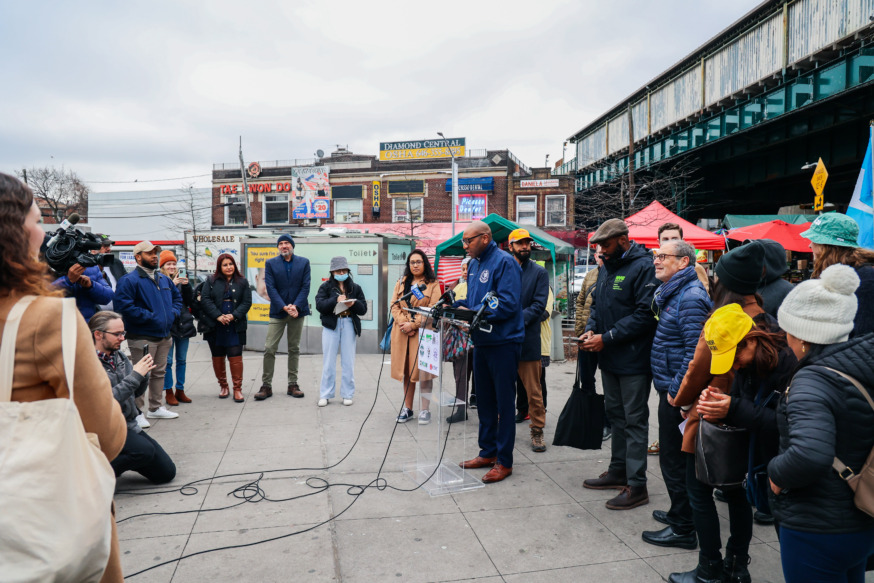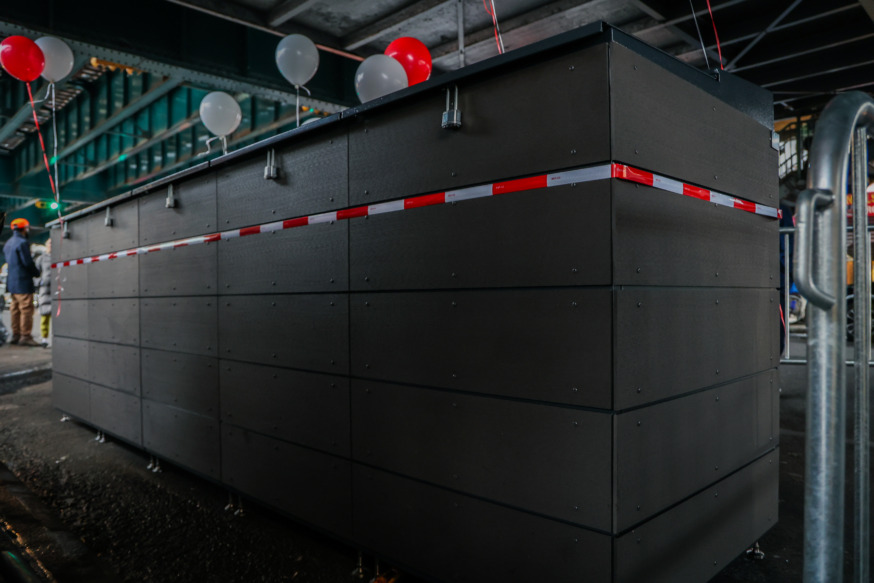
As the number of street vendors in Corona Plaza multiplied since the pandemic, so has the trash problem. Queens Borough President Donovan Richards announced a new initiative to clean up the space. (Photo by Adrian Childress)
March 29, 2023 By Bill Parry
As the number of street vendors using Corona Plaza to earn a living has exploded since the neighborhood was devastated during the initial wave of the COVID-19 pandemic, so too has the trash problem, which has grown exponentially.
On March 28, Queens Borough President Donovan Richards joined city agencies and the Street Vendor Project alongside the elevated 7 train on Roosevelt Avenue to announce the launch of the borough’s first Citibin installation. Citibins are durable outdoor containers for trash and recycling that were first introduced in Times Square last year.

(Photo by Adrian Childress)
“We’re setting a new standard right here, not just for our borough, but for the entire city on how we can come together to make sure that we can grow this economy [and] also protect the quality of life of neighborhoods, as well,” Richards said. “This may seem small, but I am so proud to say that this is Queens’ first Citibi right here and it’s one of the solutions that we know will help to curb the debris and help maintain the cleanliness of this space. We [also] hope that it will help us to curb our rats.”

(Photo by Adrian Childress)
He added that the Citibins would be managed by street vendor small business owners and is the latest in a series of investments to support the “holistic growth” of Corona Plaza.
City agencies worked with the Queens Economic Development Corporation to transform the unused space along Roosevelt Avenue between National and 104th streets in 2012, to allow vendors a place to supplement their income. When the pandemic hit, many Corona residents lost their jobs and so vending at Corona Plaza became a primary source of income for local families.
“By Christmas 2021, we had so many vendors that you couldn’t even walk on Corona Plaza, it became so crowded you just couldn’t get through, and now what we’re seeing there now are very newly arrived coming off the buses from Texas so we’re seeing new people there,” QEDC Director of Neighborhood Development Sam Massol said. “As the number of vendors grew, so did the trash problem.”
The Citibin rollout will help clean up the area and make it more appealing for visitors as the summer approaches.
“Let’s be honest, it’s underneath the subway and you’ve got tons of pigeons with residue all over the place and it’s a bit dark in the shadows of the 7 train, but people keep coming here because there’s so much good food and so much energy out there,” Massol said. “We’ve been creating cultural programming to further elevate the area with family-friendly events to elevate the entire community overall. It’s part of a marketing plan to promote the area and one of the needs is to find common ground between the vendors and brick-and-mortar businesses because they’re also going through stuff and need assistance.
The Street Vendor Project at the Urban Justice Center has been working with QEDC, and the city’s Department of Transportation and Small Business Services to make Corona Plaza an economic engine for the neighborhood.
“The residents and small businesses of Corona need support and resources to provide a boost to get them back on their feet after it was at the epicenter of the pandemic,” Street Vendor Project Deputy Director Carina Kaufman-Guitierrez said. “There’s been confusion at the plaza as to where vendors can set up and can’t set up or just competing for spaces even among themselves. How do we address that? We create a map with the vendors on where they can work. We have a growing trash problem because people don’t have access to commissary kitchens and that’s where bringing in Citibin came into place.”
She said her organization is supporting the newly formed Corona Plaza Street Vendors Association with business training and coordination with city agencies “to become the epitome of what change can be.”
Massol agreed.
“It’s about finding that common ground and what we found was they had as much problem with the garbage and they had just as much problem with public safety,” Massol said. “Now the vendors are building off that common ground by addressing those issues. I think that’s how we elevate things and you get a lot of people coming by because of the food and the music and just the general energy of the place.”
